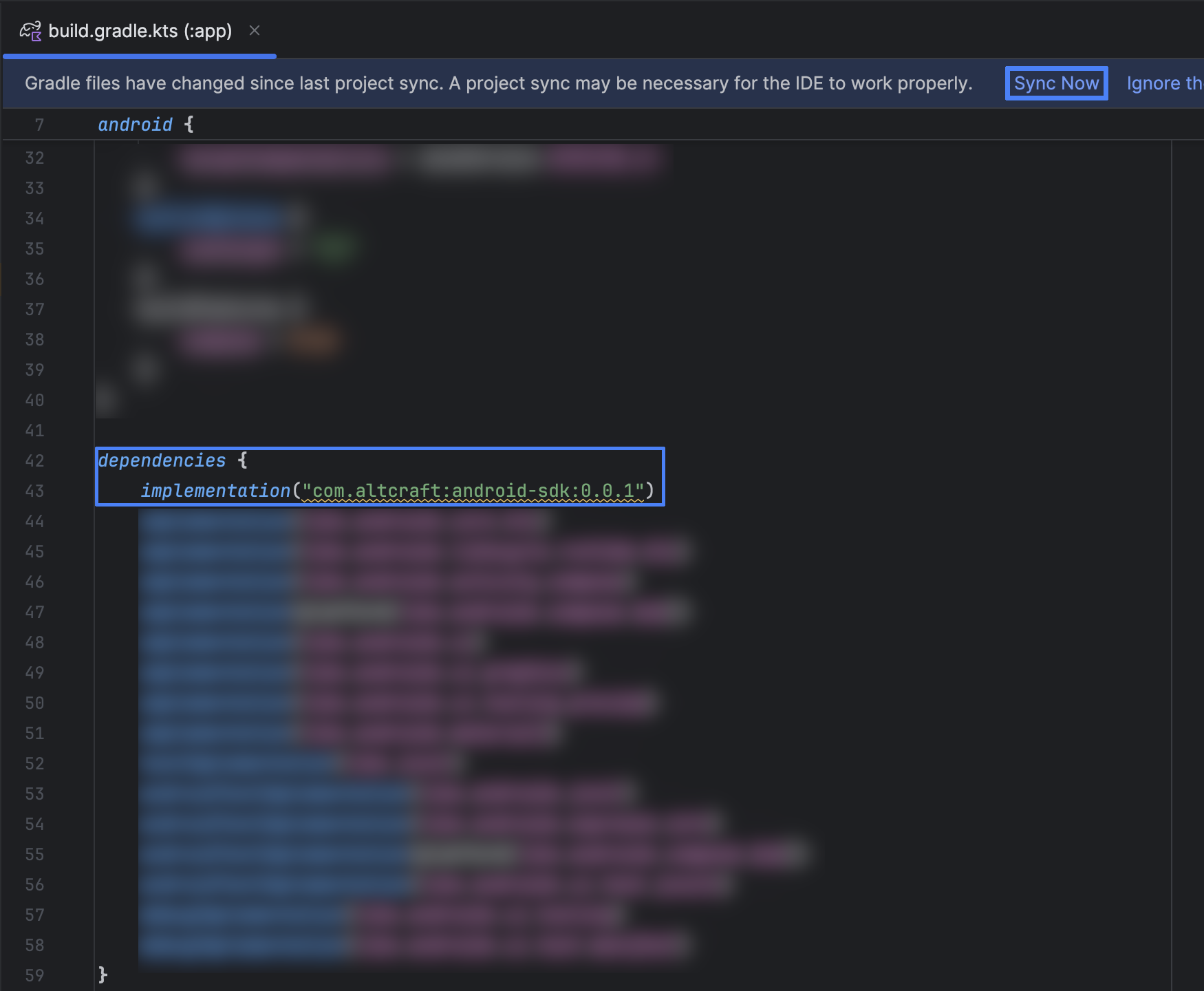Quick Start
This guide demonstrates how to quickly integrate Altcraft mSDK v2 with Firebase Cloud Messaging (FCM). After completing the steps below, your app will be able to receive Altcraft push notifications.
To use Huawei Mobile Services (HMS) or RuStore, add their corresponding SDKs to your project and implement their interfaces using the same approach as for Firebase.
Step 0. Prerequisites
- Push provider SDKs are integrated into your app project (see the corresponding integration guides);
- The app includes a class extending
Application(); - All required entities (resource, campaign, template, profile database) are pre-created in the Altcraft platform;
- On Android 13 (Tiramisu) and later, explicit user permission is required to send push notifications.
Step 1. Integrating Altcraft mSDK into the app
Add the library dependency to your app-level build.gradle.kts file:
dependencies {
implementation("com.altcraft:android-sdk:0.0.1")
}
Then sync your Gradle project.

Step 2. Implementing JWTInterface
Implement the SDK interface that provides the JWT token.
Create a class in your app module that implements JWTInterface and override the getJWT() function:
import com.altcraft.sdk.interfaces.JWTInterface
class JWTProvider(private val context: Context /** add context if required */) : JWTInterface {
override fun getJWT(): String? {
// your code returning the current JWT token
}
}
getJWT()is a synchronous function. The SDK execution thread will be blocked until the JWT is obtained.- It’s recommended that
getJWT()return the token immediately from cache (in-memory,SharedPreferences, orEncryptedSharedPreferences) to speed up requests. - Ideally, prepare and cache the JWT as early as possible (e.g., during app startup) so that the SDK can access it instantly. Returning
nullis acceptable if no token is available.
Example implementation using a suspend function
import android.content.Context
import com.altcraft.sdk.interfaces.JWTInterface
import kotlinx.coroutines.runBlocking
class JWTProvider(private val context: Context /** add context if required */) : JWTInterface {
private suspend fun fetchJwt(context: Context): String? {
// your code returning the current JWT token
return jwt
}
override fun getJWT(): String? = runBlocking {
fetchJwt(context)
}
}
Step 3. Registering the JWT provider
Register the JWT provider in Application.onCreate():
import android.app.Application
import com.altcraft.sdk.AltcraftSDK
class App : Application() {
override fun onCreate() {
super.onCreate()
AltcraftSDK.setJWTProvider(JWTProvider(/** add context if required */))
}
}
Step 4. Implementing the FCM interface
Create a class in your app module that implements FCMInterface:
Example implementation
import com.altcraft.sdk.interfaces.FCMInterface
import com.google.firebase.Firebase
import com.google.firebase.messaging.FirebaseMessaging
import com.google.firebase.messaging.messaging
import kotlinx.coroutines.tasks.await
/**
* FCM implementation for managing Firebase Cloud Messaging tokens.
*
* Provides methods to retrieve and delete FCM tokens via the Firebase SDK.
*/
class FCMProvider : FCMInterface {
/** Retrieves the current FCM token. Returns null if retrieval fails. */
override suspend fun getToken(): String? {
return try {
Firebase.messaging.token.await()
} catch (e: Exception) {
null
}
}
/** Deletes the current FCM token. */
override suspend fun deleteToken(completion: (Boolean) -> Unit) {
try {
FirebaseMessaging.getInstance().deleteToken().addOnCompleteListener {
completion(it.isSuccessful)
}
} catch (e: Exception) {
completion(false)
}
}
}
Step 5. Creating a service extending FirebaseMessagingService()
In your app module, create a class that extends FirebaseMessagingService and override onMessageReceived() to pass push data to the SDK via AltcraftSDK.PushReceiver.takePush():
Example service implementation
import com.altcraft.sdk.AltcraftSDK
import com.google.firebase.messaging.FirebaseMessagingService
import com.google.firebase.messaging.RemoteMessage
/**
* FCM service for handling push tokens and messages.
*/
class FCMService : FirebaseMessagingService() {
override fun onNewToken(token: String) {
super.onNewToken(token)
}
override fun onMessageReceived(message: RemoteMessage) {
super.onMessageReceived(message)
AltcraftSDK.PushReceiver.takePush(this@FCMService, message.data)
}
}
Step 6. Registering the FCM service in AndroidManifest
Register your FirebaseMessagingService in the app’s AndroidManifest.xml:
<!-- FCM service -->
<service
android:name="<your_package_name>.FCMService"
android:exported="false">
<intent-filter>
<action android:name="com.google.firebase.MESSAGING_EVENT" />
</intent-filter>
</service>
Step 7. Registering the FCM provider in Application.onCreate()
Register the Firebase Cloud Messaging provider in Application.onCreate():
import android.app.Application
import com.altcraft.fcm.FCMProvider
import com.altcraft.sdk.AltcraftSDK
class App : Application() {
override fun onCreate() {
super.onCreate()
AltcraftSDK.pushTokenFunctions.setFCMTokenProvider(FCMProvider())
}
}
Step 8. Initializing the SDK
In Application.onCreate(), create a configuration object and initialize the SDK using initialization().
Make sure to call initialization() after all providers (JWT and push token providers) are registered.
Initialization details
AltcraftSDK
// SDK initialization and configuration setup
└── fun initialization(context: Context, configuration: AltcraftConfiguration, complete: ((Result<Unit>) -> Unit)? = null): Unit
fun initialization(context: Context, configuration: AltcraftConfiguration, complete: ((Result<Unit>) -> Unit)? = null): Unit
Example initialization:
import android.app.Application
import com.altcraft.sdk.AltcraftSDK
import <your_package_name>.FCMProvider
import com.altcraft.sdk.config.AltcraftConfiguration
class App : Application() {
override fun onCreate() {
super.onCreate()
AltcraftSDK.setJWTProvider(JWTProvider(applicationContext))
AltcraftSDK.pushTokenFunctions.setFCMTokenProvider(FCMProvider())
val config = AltcraftConfiguration.Builder(
apiUrl = "https://pxl-your-instance.altcraft.com",
icon = R.drawable.your_icon
).build()
// set additional configuration parameters (see Android mSDK v2 README)
AltcraftSDK.initialization(context = this, configuration = config)
}
}
Step 9. Subscribing to push notifications
Use the pushSubscribe() function to subscribe to push notifications at any point in your code — for example, after obtaining user permission for notifications:
AltcraftSDK
└── val pushSubscriptionFunctions: PublicPushSubscriptionFunctions
// Subscribe to push notifications (status = SUBSCRIBED)
├─ fun pushSubscribe(
│ context: Context,
│ sync: Boolean = true,
│ profileFields: Map<String, Any?>? = null,
│ customFields: Map<String, Any?>? = null,
│ cats: List<DataClasses.CategoryData>? = null,
│ replace: Boolean? = null,
│ skipTriggers: Boolean? = null
│ ): Unit
Example subscription call:
class MainActivity : ComponentActivity() {
override fun onCreate(savedInstanceState: Bundle?) {
super.onCreate(savedInstanceState)
NotificationPermissionHandler.isGranted(
activity = this,
onGranted = {
if (isUnsubscribed()) {
AltcraftSDK.pushSubscriptionFunctions.pushSubscribe(context = this)
}
}
)
}
}